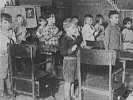
|

CSE 401, Sp '04: PL/0 - Printing |
|
 CSE Home CSE Home |
 About Us About Us |
 Search Search |
 Contact Info Contact Info |
enscript and lpr
-Zduplex to make two-column double-sided printouts. Sieg 329 and 232
both have HP LaserJet 4 printers capable of printing double sided.
enscript -2rG -p - file1 file2 ... | lpr -Zduplex -Pps232The
-2rG options specify 2 column rotated (landscape)
"Gauddy" output, including file name and username (can be left out).
The -Zduplex option makes the printer print
double-sided. Adjust the printer name with the -P
option or leave it out for your default printer.
The basic picture is that diffpp processes a newfile together with the diff of oldfile vs newfile, producing input to enscript that includes special formatting instructions. Mark's script (below) may be convenient.
#! /bin/tcsh
set diffopt = "-r Proj3 -r Proj4"
set files = ()
set allfiles = ({decl,expr,stmt}.tc.c symtab.{h,c} type.{h,c})
foreach file ($allfiles)
if ( { ( cvs diff $diffopt $file > /dev/null ) } > 0 )
then
continue
endif
set files = ($files $file)
echo $file
end
enscript -2rG -e -h -o - \
--filter="cvs diff $diffopt %s | tail +7 | diffpp %s" \
$files | ps2pdf - changed_files.pdf
The enscript options -2rG are as above, -e enables processing of the formatting escape codes produced by diffpp in the "--filter" pipline. This script assumes you are using CVS, with successive releases of your project tagged Proj3, etc.; if you use RCS instead, change cvs diff to rcsdiff, diffopt as needed, and remove tail +7 (which strips off 7 lines of CVS-specific stuff). Please proofread the output carefully; as the scripts get more elaborate there's of course increased chance of omitting important files, comparing/printing the wrong versions, etc.
Suggestions for improvements are welcome.
|
Computer Science & Engineering University of Washington Box 352350 Seattle, WA 98195-2350 (206) 543-1695 voice, (206) 543-2969 FAX [comments to cse401-webmaster at cs.washington.edu] | |